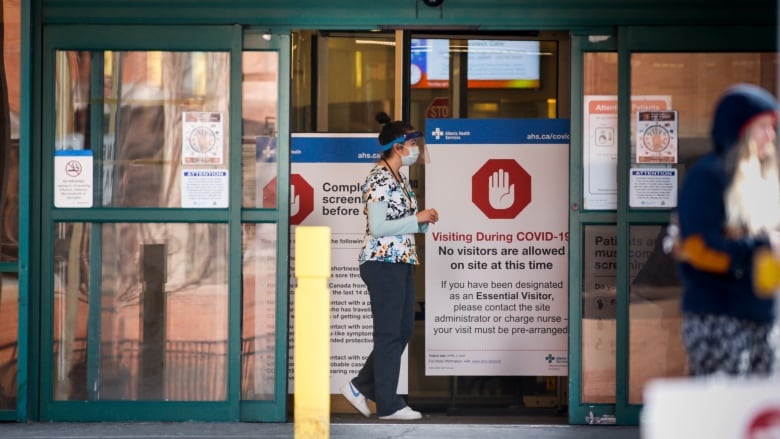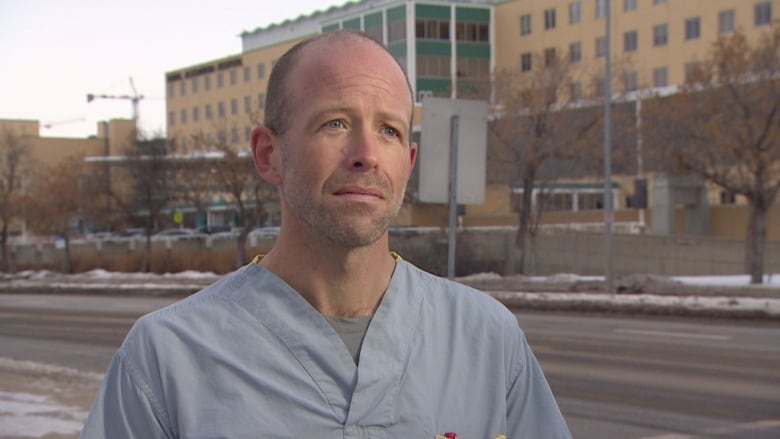Hospitals prep for 3rd wave of COVID-19 due to rise in variant numbers
Doctor says teams are planning how to isolate those with variants

Hospitals in Alberta are preparing for a third wave of the pandemic, driven by more aggressive variants of the coronavirus.
The province reported 195new cases on Tuesday of a more contagious variant of the coronavirus first reported last year in the United Kingdom.Alberta has now confirmed 1,886 cases of that variant.
On Monday, the province said the rise of variants as well as hospitalizations for COVID-19 have put off any plans for the province to move to Step 3 of its reopening plan.
"Today, while hospitalizations are indeed below 300, they've risen in recent days. The decline that we saw in January and early February has stopped,"said health minister Tyler Shandro at a press conference Monday.
Dr. Darren Markland,an intensive care physician and nephrologistat the Royal Alexandra Hospital in Edmonton,wrote in atweet on Tuesdaythat they have reopened the COVID-19 wards at their hospital.
"The ICU is preparing its surge plan again. Infection control is redesigning isolation protocols because of the variants. My apologies to restaurants and bars, but we knew this was coming,"Markland wrote.
Markland told CBC News that he's feeling the exact same way as he did in early November whenthe second wave was predicted.
"The intensive care unit is calling on all of our previous staff who we recently released to be prepared to come back as we look to expand into the recovery rooms for barrack style management of people on ventilators and high-flow oxygen," he said.
The physician addedthat the uptick in variants of concern adds another layer of stress to the healthcare system.

"Infection control is already stringing together plans to be able to house [variants of concern]patients independently because there is the possibility that variants can reinfect people who originally had COVID," he said.
Markland saidthey will have tofind extra rooms, which often don't exist,for those whohave thevariant.
"Once people start hitting the hospitals and we start increasing the density of patients who have this virus in an enclosed space, then we'll start to see a higher chance of in-hospital spread and outbreaks and lockdowns," he said.
"Those can paralyze the system very quickly."
AHS responds
Alberta Health Services told CBC News in an emailed statement that itsongoing pandemic planningwill utilize COVID-19 specific units as hospitalizations rise.
"While hospitalizations remain significantly less than what we saw in December and January, cases in hospital (including variant strains) are increasing and AHS is responding to that trend," wrote a spokesperson.
AHS addedit'swatching case numbers closely and canopen and close COVID-19 units and increase ICU capacity as needed.
Dr. Misty Watson,a physicianand hospitalist at the Rocky View General Hospital in Calgary, said she works with themajority of COVIDpatients on the inpatient unit.
She saidshe suspects that cases will continue to increase among young people.
"We know everybody's tired, they're tired of not seeing their friends. They're tired of not playing sports and because of that, it's going to continue to rise," she said.
She saidthat despite seeing an increase in cases, it's still not at the same rate as they saw in November, and that it is likely due to seniorsbeing protected by the vaccine.
However, she addedthat this doesn't mean that young peoplewon't be impacted by COVID-19.
"There are a lot of young people that have health conditions that haven't been vaccinated, that are at risk, that are staying at home and aren't able to do anything," she said.
"And I think we owe it to those people to continue to protect them."
With files from Jen Lee












_(720p).jpg)


 OFFICIAL HD MUSIC VIDEO.jpg)
.jpg)



























































































